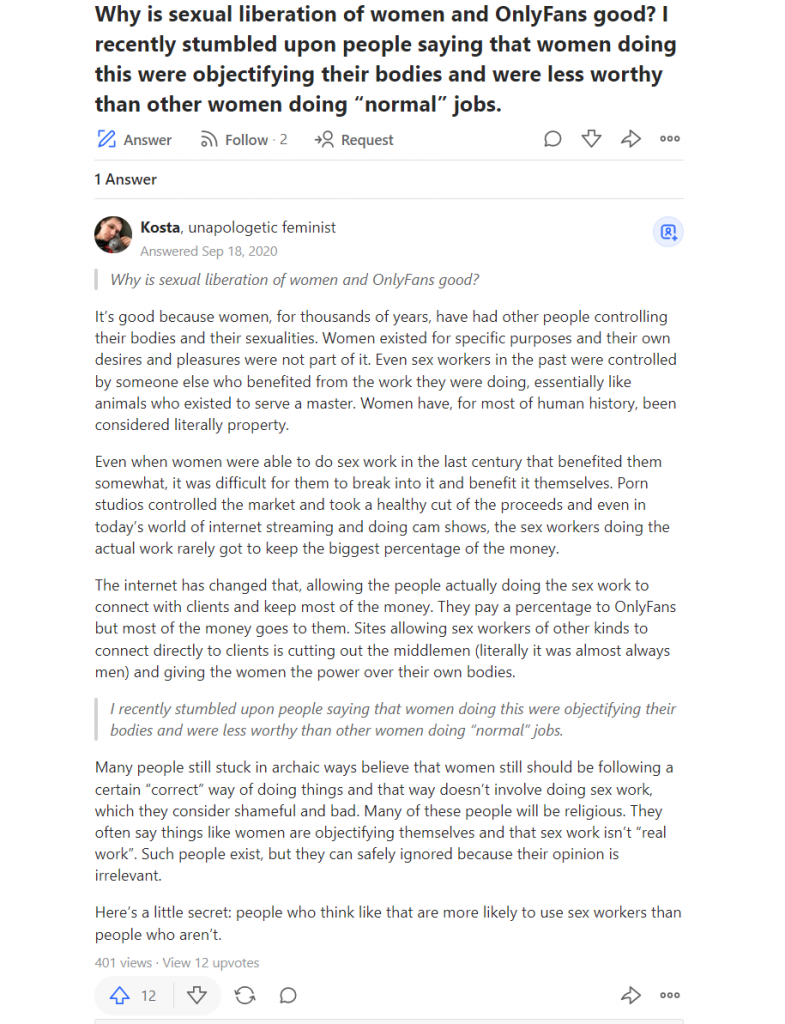OnlyFans (OF) is a subscription-based social network that allows creators and influencers to sell their content directly to their subscribers. Launched in 2016, OF is owned by Fenix International Limited, a technology company based in London. Despite marketing itself as a welcoming space for artists and creators of all genres and backgrounds, OF is most well-known in our culture as a site for adult-content creators (Dickson, 2020; OnlyFans, n.d). In this article, I will provide a very brief summary of what has been happening on the platform ever since its boom shortly after the pandemic started.
The good
Home to over 100 million users and 1.5 million creators, as of June 2021, OF’s estimated worth is over $100 billion (Jennings, 2021; Tan & Shaw, 2021). At the beginning of the pandemic, in the United States alone, 22 million people were laid off, and unemployment reached its height of 14.8% in April 2020, with women bearing a disproportionately large burden (Jennings, 2021). And when it comes to employment, COVID’s negative effects on in-person sex workers were apparent right from the start. With everything got shut down and cancelled, from bars and clubs to hotels and flights, the attack was sudden, devastating, and virtually all-at-once. In times of dire crisis like this, digital platforms like OF provide a safety net for sex workers, enabling them to sustain themselves in the comfort of their own homes (Shane, 2021). While digital sex work is everything but new, the rise of OF during the pandemic is unique in that it was associated with an influx of amateurs in the field, also due to the very same reason, unemployment during COVID (Friedman, 2021). On the other end, with the enforced minimization of physical contact, the pandemic also observed an enormous rise in loneliness and horniness, leading to a spurt in the number of users on the platform (Abad-Santos, 2020; Shane, 2021). Provided with an online space in which one’s own content can be directly monetized, a lot of creators earn more than enough to sustain themselves. “I have more money than I know what to do with”, Savannah Benavidez, an OF content creator who turned to the site after quitting her job to take care of her son during the lockdown, told The New York Times (Sweet, 2021).
The growth of OF, as well as the great success attained by many of its creators, has turned the platform into part of the cultural spirit. “Mum who lost job in lockdown set to become OnlyFans millionaire in just one year”, “We spoke to a woman earning more than $100,000 a year selling explicit content on OnlyFans – this is exactly how she makes her money”, “OnlyFans model plans to ‘keep stripping into her 70s’ despite making millions”. These are only a fraction of all the OF success stories that made headlines. On YouTube, there are videos of people, mostly women, sharing tips and tricks on how to become successful on the platform. And on TikTok, it’s not difficult to come across videos of people making banks from OF and telling others to make an account for themselves on the platform.
Because of these social media portrayals, having an OF account became such an alluring concept for many, including myself. The platform allows creators to take agency over their content and earn money directly from it for the price of a monthly subscription. It has saved so many lives during the pandemic when almost everything was shifted to the digital space. It has played a great role in calling attention to the rights of sex workers. Some people find their sexual expression on the site liberating and empowering, seeing it as a reclamation of their sexuality, and access of personal freedom (Burse, 2020). This is particularly the case for women, who constitute the primary demographics of OF creators (fact check needed). Therefore, the site has become a household name in much of our contemporary feminist discourse.

The bad
Unfortunately, it’s not all butterflies and rainbows, at least, not for everybody. First of all, the internet has always been a place full of uncertainties for sex workers. In the United States, the anti-sex trafficking law SESTA/FOSTA (Stop Enabling Sex Traffickers Act/Fight Online Sex Trafficking Act) signed by Trump in 2018 has made the situations of sex workers even more precarious than they already were (Cole, 2018). According to this law, website holders would have to take accountability if ads for prostitution from third parties are found on their sites, and this would include consensual sex workers (Romano, 2018). This is extremely harmful to sex workers because by closing down adult-content websites, sex workers would be driven to work in-person on the streets where the risks of HIV, STIs, and violence are obviously higher (Survivors Against SESTA, n.d). Unfortunately, the reality of SESTA/FOSTA carried on until this day, and OF is not exempted from abiding by this law. On the platform, creators who are discovered to be using OF for escorting, a practice that is completely prohibited on the site, will have their accounts deleted. However, there are several creators who were accused of breaching OF’s guidelines, thus, having their accounts deleted and losing not only their money but also the brand that they had painstakingly built, without any particular reason. Most recently, in August 2021, OF made an announcement that it would forbid all sexually explicit/NSFW content by October 1st, 2021, which caused panic among adult-content creators on the platform. However, the decision was retracted (Barry, 2021).
Another major problem specifically relevant to OF is the gentrification of sex work. On OF, the creators that profit the most from selling adult content are influencers who have already had a considerable amount of following from other social platforms. Although the growth of OF was largely thanks to its adult-content creators, it is not how the site advertises itself, also seemingly due to SESTA/FOSTA. Sexually explicit content is never suggested on the platform’s home page, therefore, creators have to actively look for subscribers elsewhere, otherwise, there is no way their account can be found (Shane, 2021). This issue created an enormous gap between the haves and the have-nots. To make matters worse, there was an influx of celebrities on the site during the last half of 2020, with the presence of former Disney star Bella Thorne as a case in point, who sold nude photos for $200 each, leading to OF’s restriction on one’s charging amount (Noor, 2020). On the other hand, there are people who could only make a rough amount of $500 or less on the site because their digital presence is not as prominent despite putting in even more time and effort (Friedman, 2021). The inequality that exists on this site is even more exacerbated by algorithms that take advantage of biases toward white, thin, and rich women, providing them with more visibility (Jennings, 2021).
Conclusion: What’s my take?
This blog post is a summary of what has been happening on OnlyFans ever since its growth spurt during the pandemic. OF and its impact on our society are among those topics that had to disappoint today’s Internet’s intolerance of uncertainty and obsession with black-white categorization. In other words, it’s complicated! While I do believe in the potential of OF in providing a relatively secure space for sex work, especially in times of crisis, as well as a tool for sexual liberation and agency for marginalized bodies, the way the platform is viewed in our culture, especially the TikTok Gen Z culture must be re-evaluated. The success stories of OF should not be glorified and used to mislead young people into thinking a career on OF is easy and free of treachery. As a giant tech company, I doubt that OF cares at all about the welfare of its adult-content creators, the individuals that constitute the foundation of the site.
References
Abad-Santos, A. (2020). Quarantine Horniness, Explained by a Sex Researcher. Vox. https://www.vox.com/2020/4/8/21210131/coronavirus-nudes-quarantine-sex-instagram
Barry, E. (August 26, 2021). Why OnlyFans Suddenly Reversed its Decision to Ban Sexual Content. https://time.com/6092947/onlyfans-sexual-content-ban/
Burse, S. (October 9, 2020). Opinion: OnlyFans Shows the Empowerment of Sexual Liberation. Student Printz. https://studentprintz.com/opinion-onlyfans-shows-the-empowerment-of-sexual-liberation/
Cole, S. (April 11, 2018). Trump Just Signed SESTA/FOSTA, a Law Sex Workers Say Will Literally Kill Them. Vice. https://www.vice.com/en/article/qvxeyq/trump-signed-fosta-sesta-into-law-sex-work
Dickson, E. (May 18, 2020). Sex Workers Built OnlyFans. Now They Say They’re Getting Kicked Off. Rolling Stones. https://www.rollingstone.com/culture/culture-features/onlyfans-sex-workers-porn-creators-999881/
Friedman, G. (October 21, 2021). Jobless, Selling Nudes Online and Still Struggling. The New York Times. https://www.nytimes.com/2021/01/13/business/onlyfans-pandemic-users.html
Jennings, R. (October 28, 2021). The Sexfluencers. Vox. https://www.vox.com/the-goods/22749123/onlyfans-influencers-sex-work-instagram-pornography
Noor, P. (August 31, 2020). A Thorne in the Site: the Bella Thorne and OnlyFans Controversy Explained. https://www.theguardian.com/media/2020/aug/31/bella-thorne-onlyfans-what-happened-explained
OnlyFans. (n.d). “About” page. OnlyFans. Retrieved December 15, 2021 from https://onlyfans.com/about
Romano, A. (July 2, 2018). A New Law Intended to Curb Sex Trafficking Threatens the Future of the Internet as We Know it. Vox. https://www.vox.com/culture/2018/4/13/17172762/fosta-sesta-backpage-230-internet-freedom
Shane, C. (May 18, 2021). OnlyFans Isn’t Just Porn ;). The New York Times. https://www.nytimes.com/2021/05/18/magazine/onlyfans-porn.html?login=smartlock&auth=login-smartlock
Sweet, J. (2021). The Loneliness Pandemic. Harvard Magazine. https://www.harvardmagazine.com/2021/01/feature-the-loneliness-pandemic Tan, G. & Shaw, L. (June 16, 2021). OnlyFans Seeks New Funding at Valuation Above $1 Billion. Bloomberg. https://www.bloomberg.com/news/articles/2021-06-16/onlyfans-is-said-to-seek-funding-at-valuation-above-1-billion



Great content! I think you are highlighting some important matters related to OF. People think they can easily become rich via OF, but this is only the case for a few people. The website appears to be very popular in gen-z, who often expect money to come overnight. However, maintaining an OF account takes effort and time, which a lot of people tend to forget. Maintaining your account and subscribers requires energy and if you do not you simply lose subscribers and therewith your income. As OF is the only source of income for many creators, the platform should do more to protect its creators and make sure it is a safe and rewarding space for any member.
You know that that is not going to happen. As long as the platform can make money from it with the least amount of effort then they are happy. Protection the people is not important to them as long as they are not legaly bound to do that.
It’s unfortunate but true… I mean if a platform as large and culturally pervasive as Youtube isn’t afraid to throw its top creators under the bus for one reason or another I don’t see why OnlyFans would do anything differently. I think the nature of the content on OnlyFans means they SHOULD be held to a higher standard because I can imagine it’s much harder to reintegrate into the ‘standard’ job market if your career falls through, but at the end of the day the corporate actors are focused on traction and profit margins so they aren’t likely to get involved unless it benefits them in some way.
It’s a very thought-through post! I like that you make so many references. The topic is indeed trendy. The modern generation really wants to get money out of “nothing”. At least, they don’t usually want to work as it is commonly understood. And the new technologies make it quite possible, like Tick Tock, Instagram, YouTube, and of course Only Fans. As always, there are two sides of this question, just like you mention in the post. It can be both beneficial and dangerous and personally, I cannot decide on my opinion about it.